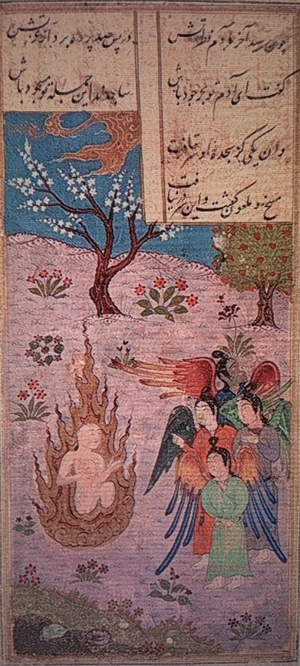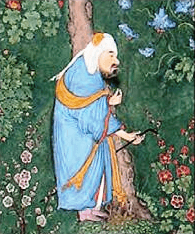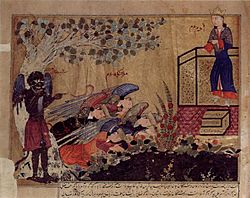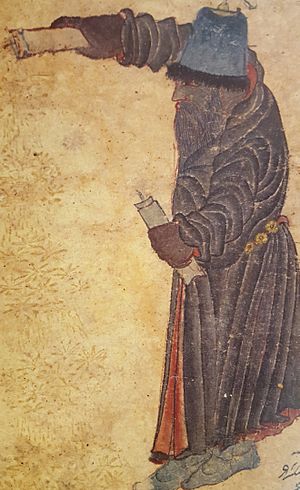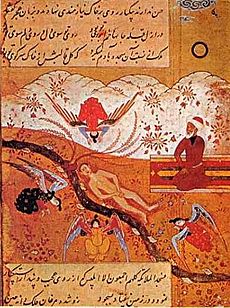Iblis facts for kids
Iblis (also known as Eblīs) is a very important figure in Islam. He is seen as the leader of the devils (called shayāṭīn). The Quran, which is the holy book of Islam, tells us that Iblis was kicked out of heaven. This happened because he refused to bow down to Adam, the first human.
There are two main ideas about where Iblis came from and what he truly is. One idea says that Iblis was once a very high-ranking angel named Azazil. God sent him to clear the Earth of its disobedient inhabitants. But when God decided to create humans to live on Earth, Iblis disagreed. Because of his objection, he was punished and sent down to Earth as a shayṭān (devil).
The other idea says that God created Iblis from fire found deep beneath the Earth. Iblis worshipped God for thousands of years. Because of his strong devotion, he was allowed to rise up and join the angels in the highest heaven. When God created Adam and taught him many things, God then told all the angels to bow to Adam. But Iblis, who was a jinn made of fire, refused. He felt he was better than Adam, who was made of clay. This pride and disobedience led to his downfall. He promised God that he would try to mislead humans and prove they were not worthy. Because of this, Iblis became an eternal enemy of humankind.
In Islamic tradition, Iblis is often called al-Shayṭān ("the Devil"). He is also known as al-Rajim, which means "the Accursed." The name Shayṭān is usually used to describe his role as a tempter. Iblīs is his actual name. Some Sufi Muslims have a different view. They see Iblis not just as the Devil, but as someone who truly believed in only one God. They believe he worshipped only the Creator, not His creations.
Contents
What's in a Name?
The name Iblīs might not be his real name. It could be a title that describes him. It might come from an Arabic word that means "to remain in grief" or "to despair." Many Arab scholars believe this. They say his original name was Azazil. For example, an old scholar named Ibn Mandhur said that the name "Iblis" comes from the idea of despairing of God's mercy.
Some Muslim teachers connect the name to talbis, meaning "confusion." They say God's command confused him. Another idea is that the name comes from the Ancient Greek word diábolos, which is where the English word 'devil' comes from.
The name Iblis was not found in Arab writings before the Quran. But it does appear in an old Christian book written in Arabic.
Iblis is also known by other names or titles in Islamic traditions. These include:
- Abū Murrah ("Father of Bitterness")
- ‘aduww Allāh ("enemy of God")
- Abū Al-Harith ("the father of the plowmen")
- Abū Kardūs ("Father who piles up or crowds together")
Who is Iblis? Angel or Jinn?
People have different ideas about whether Iblis was a fallen angel, a jinni, or something else entirely. The Quran itself doesn't give a clear answer. It includes Iblis in the command given to the angels, but it also says he was "from the jinn." Scholars and academics still discuss what this means.
In early Christian writings, there were stories about angels bowing down, with one exception. This makes some people think Iblis was meant to be an angel. Some compare him to Samael, a figure in Jewish tradition. Both are said to be created from fire and to oppose God's new creation out of jealousy.
Some scholars argue that Iblis being a jinni is unlikely to be the main idea in the Quran. They point out that when the Quran calls Iblis a jinni, it doesn't mention his creation from fire. And when his creation from fire is mentioned, it doesn't connect it to the fire of the jinn. The Quran describes jinn fire as "smokeless," but Iblis's fire is never described this way. In ancient traditions, not just jinn, but also angels like Seraphs, were linked to fire.
Other scholars suggest that the idea of Iblis being a jinni might have been added later. They think that originally, Iblis was seen as an angel, but later he was grouped with jinn as evil spirits. Some believe that Iblis was first considered an angel, but then became a jinni in later parts of the Quran.
The idea that angels cannot sin is a later belief in Islam. This belief makes it necessary for Iblis to be a jinni, because jinn have free will and can choose to disobey. If angels don't have free will, then Iblis couldn't have been an angel if he disobeyed.
What Does Islamic Belief Say?
Islamic theology looks at Iblis's role in the Quran and the idea of free will. Some groups, like the Muʿtazila, believe Iblis freely chose to disobey. Others say that God planned for Iblis to disobey. This way, God could show all His qualities and teach humans about the results of sin.
Most scholars believe Iblis is just a creature. He cannot create evil in the world. As a devil, he is only a tempter. He uses human weaknesses to lead people away from God's path. Iblis and his devils can only do this with God's permission. Muslim theologians reject the idea that God and the devil are two separate, opposing forces. They say this idea comes from older beliefs.
Iblis is also seen as the ancestor of all devils. He is sometimes called the "father of the devils."
Iblis in the Quran
Iblis is mentioned by name 11 times in the Quran. Nine of these times are about his refusal to bow to Adam. The word Shaytan is used more often. Sometimes Iblis is called Shaytan, but the two words are not always the same. The story of Iblis is told in different parts of the Quran.
Here's a summary of his story: When God created Adam, He commanded the angels to bow before this new creation. All the angels bowed, but Iblis refused. He argued that he was made from fire, which he thought was better than humans, who were made from clay. He felt he should not bow to Adam. Because of his pride, God banished Iblis from heaven and said he would go to hell.
Later, Iblis asked God for the power to try and mislead Adam and his children. God allowed this. But God also warned Iblis that he would have no power over God's true servants.
Who Iblis Really Is
There are different ideas about what "among the jinni" means in the Quran. Besides the Quran's story, Islamic scholars have two main ideas about Iblis's origin. One says he was a noble angel. The other says he was a low-ranking jinn who worked his way up to heaven. Some also think he is simply the ancestor of jinn. They believe he was created in Heaven but fell because he disobeyed, just as Adam fell from Paradise when he sinned. It might be at this moment that Iblis turned into a jinn, after being an angel made from fire.
Many early Quran scholars, like ibn Abbas and Tabari, believed Iblis was originally an angel. Some described him as "one of the closest Angels." According to some traditions, the word jinn in Iblis's case refers to jannah (heaven). This would mean Iblis was a guardian and a type of "fiery angel." These angels, made from fire, are different from angels of mercy (made from light) and earthly jinn (made from "smokeless fire"). Some scholars argue that if Iblis were a jinni, he couldn't have been a guardian of paradise among the angels.
However, other scholars, like Hasan al-Basri, believed Iblis was a jinni and had free will, unlike angels. They argue that angels do not have free will, so Iblis could not have been an angel if he chose to disobey. This idea is supported by some modern scholars as well.
Some believe that Iblis's disobedience was part of God's plan. They say God created Iblis differently from other angels, giving him a rebellious nature. This way, Iblis would rebel and be given the job of tempting humans, just as other angels have different jobs.
What Happens to Iblis?
The Quran says Iblis will go to hell. But scholars disagree on whether he is already there or will go after Judgment Day. Some say he and his devils are the first to enter hell forever. Others say he is already there. Since devils are made of fire, some think they won't burn in hell. Instead, they might suffer from intense cold.
Another idea is that Iblis will be killed before Judgment Day. Among Shia Muslims, many believe that the Mahdi will kill Iblis. In books about the end times, it's said that when Iblis is the last one on Earth, angels of justice will capture and kill him.
Some also argue that Iblis doesn't act on his own free will, but as a tool of God. When Iblis was sent to hell, he didn't ask to be saved from punishment. Instead, he asked for a chance to prove he was right by leading humans into sin. So, God made him a tempter for humanity as long as his punishment lasts. Some writers believe Iblis might be saved after the world ends. His time in hell could be temporary. After his job as a tempter is over, he might return to God as one of the most loved angels.
Iblis in Sufism
Sufism, a mystical branch of Islam, has a different view of Iblis. They see him as part of a bigger plan for the universe. Some Sufis believe Iblis, along with Muhammad, was one of the two true believers in one God. They see him as God's tool for punishment and deception. Because of this, some Sufis think Iblis refused to bow to Adam because he was devoted only to God and would not bow to anyone else. However, not all Sufis agree that Iblis can be redeemed.
By seeing less evil in Iblis, Sufism also reduces the idea of two opposing forces (good and evil). This fits with the Sufi idea of "unity of existence," which rejects two separate powers. Some Sufis believe that thinking evil is caused by something other than God is a great sin. Because Iblis chose to be damned rather than bow to anyone but God, he became an example of unrequited love.
However, this view goes against the Quran. The Quran clearly states that Iblis refused to bow out of pride and arrogance, and describes him as being among those who do not believe.
The "True Monotheist" Idea
Some Sufis have a positive view of Iblis's refusal. They argue that Iblis had to choose between God's direct command and God's true will. They believe Iblis refused to bow to Adam because he was devoted only to God. So, Iblis followed God's true will by disobeying His command. This belief is sometimes called "Satan's monotheism."
A famous story tells of an encounter between Moses and Iblis on Mount Sinai. In this story, Moses asks Iblis why he refused God's order. Iblis replies that the command was actually a test. Moses then says Iblis was punished by becoming a devil. Iblis answers that his current form is temporary, but his love for God remains the same.
For some Sufi thinkers, Iblis was a perfect example of a lover who sacrificed himself. He refused to bow to Adam out of pure devotion to God. Some mystics even argued that evil is also God's creation. If evil existed without God's will, then God would not be all-powerful, and a powerless being cannot be God.
Keeper of Paradise
While the Quran only shows Iblis falling and trying to mislead humans, another role for him developed: as the gatekeeper of God's essence. This idea might come from old oral stories. In some interpretations, Iblis is linked to a "light" that misleads people. Hasan of Basra reportedly said, "If Iblis were to show his light to mankind, they would worship him as a God."
Some Sufis believe Iblis represents the "Dark light" of the earthly world, which is opposite to the divine light of the heavens. In this view, Iblis acts as a treasurer and judge, separating sinners from true believers. He tests people to see if their worship of God is real or just on the surface. Only those who pass Iblis's test can reach God's true presence.
Stories and Art
The Story of Iblis
Most stories about Iblis involve a battle between angels and jinn. But the stories differ on whether Iblis was an angel or a jinn during this battle.
In one version, Iblis was a jinn living on Earth before humans were created. When angels came to fight the jinn, they took prisoners, including Iblis. He was brought to heaven. Because he was pious, unlike other jinn, the angels were impressed. Iblis was allowed to join the angels and rise in rank. Even though he looked like an angel, he was still a jinn inside. This is why he was able to disobey God later. He was then sentenced to hell forever. But God granted him a favor for his past worship: to take revenge on humans by trying to mislead them until Judgment Day.
Stories that see Iblis as an angel often describe him as a high-ranking angel called Azazil. In these stories, Azazil/Iblis was the leader and teacher of the angels. He became a guardian of heaven and was closest to God's throne. God gave him power over the lower heavens and Earth. When God sent angels to Earth to fight the jinn, Azazil/Iblis and his army drove the jinn to the edge of the world.
Knowing how corrupt the previous Earth inhabitants were, Iblis protested when told to bow to Adam. He thought angels, who praise God day and night, were better than humans made of mud. He even thought he was better than other angels because he was made of fire. But God punished him for his pride and sent him to hell.
It is said that Iblis once had four wings. After he was cursed, his form changed from an angel to a devil. God changed his neck to that of a pig and his head to that of a camel. His eyes stretched across his face, and he grew boar-like fangs. Only seven hairs grew on his beard.
After he was cast out, God allowed him to have children. God put hatred in Iblis, and a spark of fire came from him. From this spark, God created Iblis's wife. Other stories say God made Iblis both male and female, and he had offspring by himself.
Stories of the Prophets
According to the Stories of the Prophets, Iblis used the biblical serpent to sneak into Adam's garden in Eden. The garden was guarded by an angel. Iblis tricked a peacock, telling it that all creatures die and its beauty would fade. But if it got the fruit of eternity, it could make everyone immortal. So, the peacock convinced the serpent to carry Iblis into the Garden in its mouth.
In a similar story, Iblis was kept away by the guardian angel's burning sword for 100 years. Then he found the serpent. He told the serpent that since he was once a high-ranking angel, he would one day return to God's grace. He promised to be grateful if the serpent helped him. In both stories, Iblis speaks through the serpent to Adam and Eve, tricking them into eating from the forbidden tree.
How Iblis is Shown in Art
Iblis is a well-known supernatural being and has been shown in many artworks. He is described as both a pious jinn and sometimes an angel before he fell from God's grace. After he refused to bow to Adam, Iblis became a shaytan.
In old Islamic paintings, Iblis is often shown with a black face and a black body. These features symbolize his corrupted nature. Another common way to show Iblis is with a special head covering, different from a traditional Islamic turban. However, in one painting, he wears a traditional Islamic head covering. This might refer to a story where he wore a turban when he was sent down from heaven.
Many pictures show Iblis at the moment when the angels bow to Adam. In these, he is usually seen in the background, his face changed, and his wings burned. He looks envious, like a devil. Iblis and his followers are often shown in old art as creatures with flaming eyes, wearing only a short skirt. Like European art that used features of pagan gods to show devils, these demons were often shown in a way similar to Hindu gods.
Iblis in Books
In the novel Vathek (1782) by William Beckford, the main characters go into the underworld, which is Iblis's domain. They meet Iblis, who is described not as a monster, but as a young man. His face is regular, but his eyes show both pride and despair. His hair looks like that of an angel of light.
In the poetry of Muhammad Iqbal, Iblis criticizes too much obedience, which led to his own downfall. But Iblis is also not happy about humans obeying him. He actually wants humans to resist him. He hopes that if humans resist him, he might eventually bow to a perfect human, which would lead to his own salvation.
The Egyptian writer Tawfiq al-Hakim wrote a story called al-Shahid (1953). It talks about why Iblis's evil is needed in the world. In the story, Iblis tries to repent and become a Muslim. But religious leaders reject him, realizing that without Iblis's evil, much of the Quran would become meaningless. Iblis then goes to heaven, but the angel Gabriel also rejects him, explaining that Iblis's curse is necessary for God's light to be seen on Earth. Iblis then shouts, "I am a martyr!" This story was criticized by some Islamic scholars as being disrespectful.
Images for kids
- Elbis
- Ghaddar
- Gnosticism
- Mastema
- Melek Taus
- Mara (demon)
- 3 Meqabyan
- Prince of Darkness (Manichaeism)
- Questions of Bartholomew
- Samael
- The five children of Iblis
See also
 In Spanish: Iblís para niños
In Spanish: Iblís para niños
 | William L. Dawson |
 | W. E. B. Du Bois |
 | Harry Belafonte |


